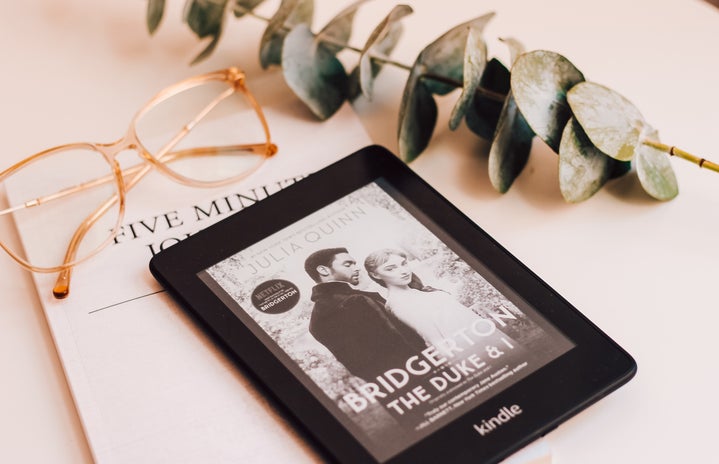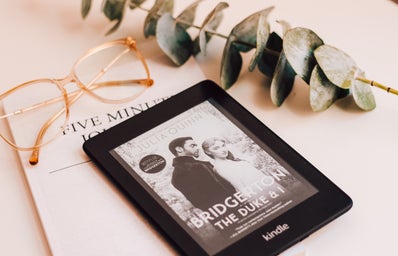Like many book lovers, I was initially skeptical about jumping into the world of Amazon e-readers. As an avid paperback reader, I couldn’t understand why anyone would choose a digital screen over real paper pages. I remember my mom getting a Kindle for her birthday a couple of years ago and shaking my head at the idea.
However, since becoming a university student, the reduced eBook prices advertised on the Indigo/Kobo website became increasingly tempting. Moreover, with quarantine being what it is, going to the bookstore is slightly more complicated than it was in a pre-covid world. After many confusing curbside pickup endeavours and seeing the holiday sale price, I decided to finally take the plunge and ask for a Kindle for Christmas.
I’ve had the device for a couple of months now and recently finished my first book (House of Earth and Blood by Sarah J. Maas – which I would highly recommend to any fantasy lovers!). Despite my skepticism, the device ended up pleasantly surprising me.
Almost immediately, I discovered that many of my initial judgements about e-readers were wrong. Most notably, the screen doesn’t strain or irritate your eyes at all, as I had previously thought. In fact, the device offers settings that allow you to adjust the brightness to your liking. I also found out that turning the pages wasn’t difficult, and a simple swipe is all it takes to continue reading. My only advice is to swipe rather than tap the screen.
Since I read most of my schoolwork on my laptop, I worried I would associate reading books on a screen with lecture material. Luckily, I found that the stark differences between the two screens’ harshness and the content itself were enough to separate the concepts in my mind.
Misconceptions aside, my experience with the KindIe came with its positives and negatives. Being the total control freak that I am, I made a list of pros and cons for those considering giving the device a try.
Pros
- More portable for travelling
This way, your luggage won’t weigh a ton in books like mine used to.
- Significantly lighter than a book
Speaking of weight, with the Kindle, you don’t have to lug a heavy book while you read, giving your arms a break.
- Perfect for reading in bed
Never underestimate the benefits of being able to read while lying on your side.
- Books become more accessible
As I have mentioned, quarantine hasn’t made purchasing physical books the easiest. Plus, the idea of getting a library book that other people have touched seems pretty unappealing right now anyway.
- o Connects to Goodreads
What’s better than seeing your “to be read” list and your to-be-read books all in the same place?
- You can organize your books into folders
This feature simulates the process of organizing books on your bookshelf without needing the extra furniture.
- The settings let you change the brightness and font size to your liking
Whether that’s making the font bigger or the screen brighter, this option allows you to make the page display more comfortable for you to read.
- You don’t have to read under a light
Since the device is backlit, you can read it anywhere; you are no longer confined to the nearest lamp.
- You can bookmark multiple places easily
I can’t be the only one who likes to bookmark their favourite sections of books. With the device, you can easily tap on the bookmark button without wasting multiple pieces of paper.
- You can search and highlight words
For those moments when you forgot to bookmark, this feature can help you find and highlight the sections you need.
- eBooks are cheaper
As I said before, eBooks tend to be more cost-effective than physical books. This price difference is beneficial to my fellow budgeting university students.
Cons
- Difficult to tell where you are in the book
To track progress, the device provides a percentage at the bottom of the screen. Although helpful, I found that envisioning a percentage was more difficult than literally looking at how many physical pages are left.
- You don’t see the cover as much or in colour
I don’t care what anyone says: book covers matter. When reading on my Kindle, I didn’t get to see the cover as much. I also noted that book covers on the device appear black and white, which doesn’t always do the artwork justice.
- You are limited to a battery
As with all devices, the Kindle is tied to its battery life. Although the battery lasts for many days, it’s still annoying to have to take a charging break when you’re at a good part – or even worse, having the device die mid-page.
- Turning back pages
Although I mentioned that turning pages is simple, I found that going backwards isn’t as easy. In my experience, the device sometimes has a hard time distinguishing between going forwards vs. backwards.
- You can’t lend your books to your friends
Sometimes when I read a book I love, I’m so excited that I have to share it with someone else. Unfortunately, unless your friend also has a Kindle, it’s pretty difficult to lend your eBooks to others.
With all that said, I do believe the Kindle is a worthwhile investment. As you can see above, the benefits far outweigh the drawbacks.
I know I needed to hear this before I bought one, so I’m just going to say it: getting a Kindle doesn’t make you a bad book reader. There is a stigma around digitizing books in the literary community, and many people tend to have strong opinions on the matter. However, don’t let other people’s judgement stop you from reading books whichever way is most convenient to you. Reading for pleasure is about pleasure, after all.
Western University has recently had to grapple with this issue when they digitized a large portion of the books in Weldon Library last year. I attended an event called Inventory and Invention hosted at King’s University College, which discussed the recent changes and the digitization of literature as a whole.
One takeaway that I learned from the event is that neither eBooks nor print copies are better than the other, and that the most important thing is to have balance. That being said, being a Kindle user doesn’t mean you have to only buy eBooks. You too can maintain a balance and continue to buy paperbacks.
So, if you are like I was and are skeptical about getting a Kindle, I encourage you to give it a try! Speaking from one paperback lover to another, this device can solve many of your reading trials and tribulations. I mean, why not try something new to spice up your reading experience?
If you’re still not completely sold on eBooks or don’t want to commit to purchasing a Kindle, borrowing digital books from your local library is a great way to test the waters without having to make a full commitment! Many of London’s libraries use Overdrive or cloudLibrary, which grants users easy access to an endless supply of digital books. Plus, who knows, eBooks might surprise you, and the Kindle may soon be added to your Amazon shopping cart.
Related Articles
Want more HCW? Check us out on social media!
Facebook, Twitter, Instagram, Pinterest
Subscribe to our newsletter!



